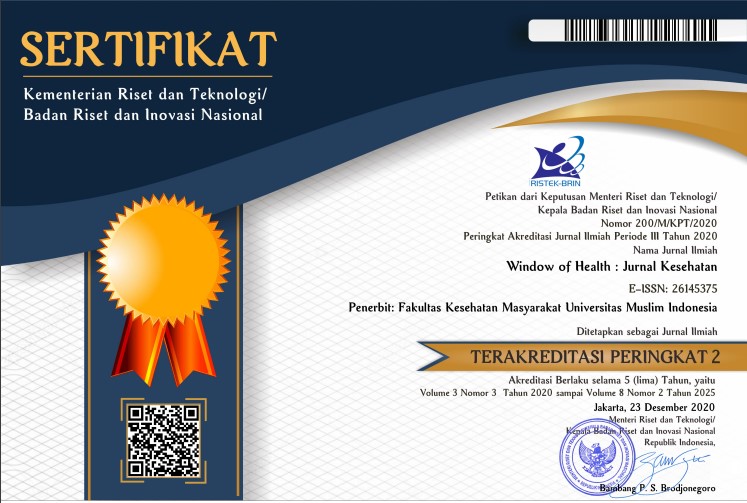The Association Between the Characteristics of Pregnant Women with Knowledge and Attitudes Toward Midwifery Care Based on Gender Sensitivity
Abstract
Respectful maternity care must be ensured that all pregnant women can accept it. It is necessary to understand all pregnant women receiving midwifery care with a gender-sensitive approach to prevent the possibility of mistreatment, harassment, or violence during midwifery practice. This study aimed to assess the association between the characteristics of pregnant women and the knowledge and attitudes regarding gender-sensitive midwifery care. This was a cross-sectional study on 200 pregnant women who came to get antenatal care services at independent practice midwives. The sample was selected using a purposive sampling technique. Multivariate logistic regression analysis was performed to obtain the odds ratio, 95% confidence interval, and p-value for the trend to assess the strength of the association. Data was collected using a questionnaire that was developed and has been assessed for validity and reliability. Pregnant women who actively participate in community activities are associated with good knowledge of midwifery care with a gender sensitivity approach (OR equal 1.51, OR equal 1.16-1.97, p-value equal 0.03). Pregnant women with higher education levels are associated with a good attitude toward midwifery care with a gender sensitivity approach (OR equal 2.02, 95% CI equal 1.01-4.05, p-value equal 0.04). Pregnant women participating in community activities are associated with good knowledge about midwifery care with a gender sensitivity approach, and pregnant women with higher education levels are associated with good attitudes about midwifery care with a gender sensitivity approach (p-value less than 0.001). Midwives and other health workers educate pregnant women in all health facilities at every antenatal visit and community activities such as the village community health center.
References
Betron ML, McClair TL, Currie S, Banerjee J. Expanding the agenda for addressing mistreatment in maternity care: A mapping review and gender analysis Prof. Suellen Miller. Reprod Health. 2018;15(1):1–13.
WHO. The network to improve quality of care for maternal, newborn and child health [Internet]. Who. 2018. 5–10 p. Available from: https://apps.who.int/iris/bitstream/handle/10665/272612/9789241513951-eng.pdf?ua=1
Wang GZ, Pillai VK. Women’s reproductive health: A gender-sensitive human rights approach. Acta Sociol. 2001;44(3):231–42.
Moyer CA, Mustafa A. Drivers and deterrents of facility delivery in sub-Saharan Africa: A systematic review. Reprod Health. 2013;10(1).
Herwansyah H, Czabanowska K, Kalaitzi S, Schröder-Bäck P. Exploring the Influence of Sociodemographic Characteristics on the Utilization of Maternal Health Services: A Study on Community Health Centers Setting in Province of Jambi, Indonesia. Int J Environ Res Public Health. 2022;19(14):1–13.
Kuruvilla S, Bustreo F, Kuo T, Mishra CK, Taylor K, Fogstad H, et al. The Global strategy for women’s, children’s and adolescents’ health (2016-2030): A roadmap based on evidence and country experience. Bull World Health Organ. 2016;94(5):398–400.
Simbar M, Rahmanian F, Nazarpour S, Ramezankhani A, Eskandari N, Zayeri F. Design and psychometric properties of a questionnaire to assess gender sensitivity of perinatal care services: A sequential exploratory study. BMC Public Health. 2020;20(1):1–13.
Yusran S, Thomas D, Matoka U, Mokodompit E. Unequal Access to Maternal and Neonatal Health in Indonesia with Gender Perspective. 2019;
Morgan R, Tetui M, Kananura RM, Ekirapa-Kiracho E, George AS. Gender dynamics affecting maternal health and health care access and use in Uganda. Health Policy Plan. 2017;32:v13–21.
Crawford-Williams F, Fielder A, Mikocka-Walus A, Esterman A. A critical review of public health interventions aimed at reducing alcohol consumption and/or increasing knowledge among pregnant women. Drug Alcohol Rev. 2015;34(2):154–61.
Makayaino H, Dolan MW. Determinan Kesediaan Ibu Hamil Mengikuti Vaksinasi Covid-19. Wind Heal J Kesehat. 2022;5(4):752–9.
Hughes CS, Kamanga M, Jenny A, Zieman B, Warren C, Walker D, et al. Perceptions and predictors of respectful maternity care in Malawi: A quantitative cross-sectional analysis. Midwifery [Internet]. 2022;112:103403. Available from: https://doi.org/10.1016/j.midw.2022.103403
Rezaeian M, Soltani R, Javaheri S, Mazaheri M, Sharifirad G. A survey on the effects of husbands′ education of pregnant women on knowledge, attitude, and reducing elective cesarean section. J Educ Health Promot. 2013;2(1):50.
Asaduzzaman M, Kabir MS, Ali RN, Mirjana R-M. Gender Inequality in Bangladesh. J Women’s Entrep Educ [Internet]. 2015;3–4:54–64. Available from: http://www.ien.bg.ac.rs/images/stories/Izdavastvo/Casopis JWE/2015/15jwe34_3.pdf
Peter E, Chinyere A. Gender inequality in reproductive health services and sustainable development in Nigeria: A theoretical analysis. Int J Sociol Anthropol. 2015;7(2):46–53.
Maryanah M, Supradewi I, Barkinah T. The Impact of The Strengthened Gender Sensitive Midwifery Care on Pregnant Women’s Knowledge, Attitude and Acceptance of Midwifery Care. Women, Midwives and Midwifery. 2021;1(3):39–46.
Ichwan EY, Susana Y, Nirmala Sari G. The Effectiveness of Antenatal Care with a Gender Responsive Approach. J Midwifery [Internet]. 2022 Jul 30;7(1):8. Available from: http://jom.fk.unand.ac.id/index.php/jom/article/view/483
Taheri Z. Childbirth choice and effect of education. Int J Epidemiol Res. 2014;1(1):44–6.
Terzioglu F, Kok G, Guvenc G, Ozdemir F, Gonenc IM, Hicyilmaz BD, et al. Sexual and Reproductive Health Education Needs, Gender Roles Attitudes and Acceptance of Couple Violence According to Engaged Men and Women. Community Ment Health J [Internet]. 2018;54(3):354–60. Available from: http://dx.doi.org/10.1007/s10597-017-0227-3.
Copyright (c) 2024 Maryanah, Sri Sukamti, Aticeh

This work is licensed under a Creative Commons Attribution-NonCommercial-ShareAlike 4.0 International License.








